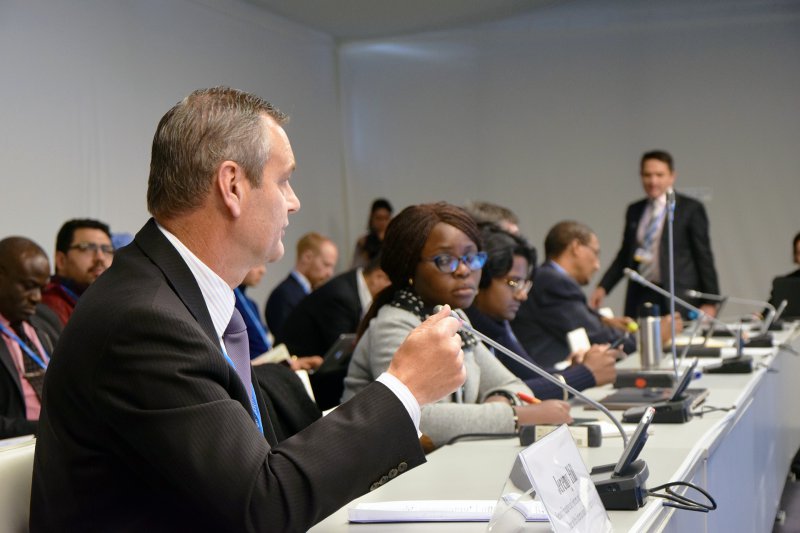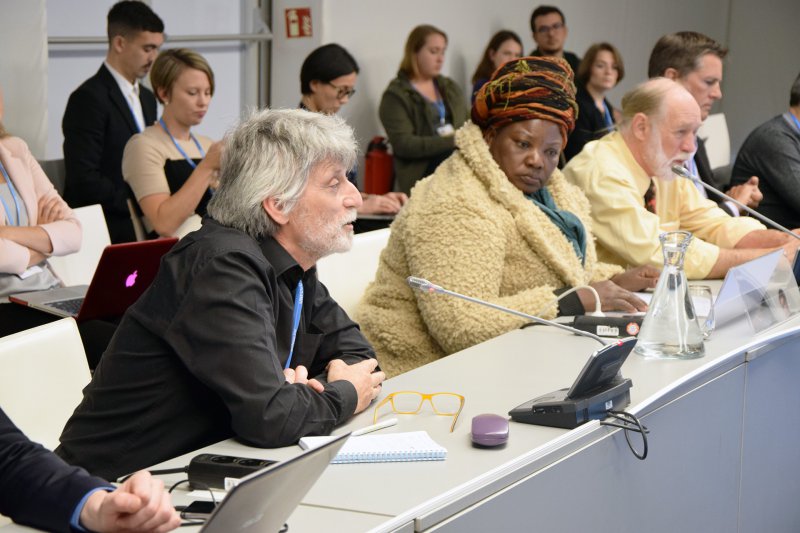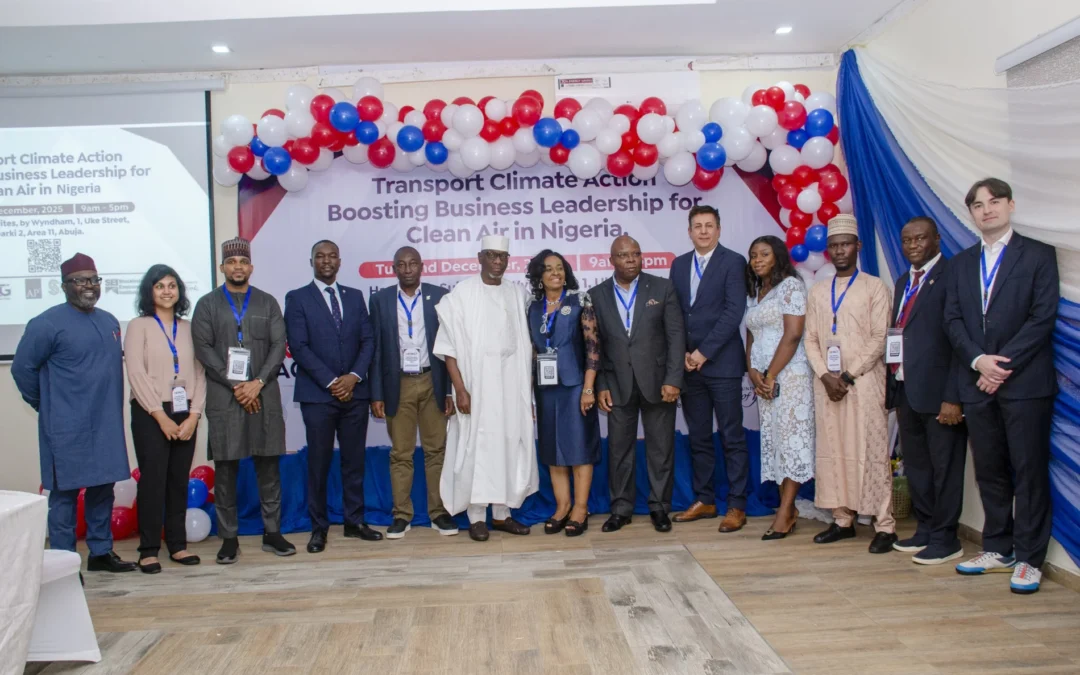A High-Level Roundtable on “Rural Transformation: Climate Resilient and Low Emission Food Systems” was held on November 14, 2017 in Bonn, Germany during COP23. Around 40 representatives from government authorities, development agencies, civil society, the academia, the private sector, and farmers joined the roundtable. The roundtable has provided a platform for cross-sector learning and exchanges to identify the key policy and investment needs to achieve the Sustainable Development Goal 2 on Zero Hunger and the implementation of countries’ Nationally Determined Contributions (NDCs) in two areas:
- The development of climate-resilient and low-emission food systems that foster food security and nutrition and leaves no-one behind;
- The acceleration of climate-smart transport systems and infrastructure to foster market linkages and connect value chain actors in the agriculture sectors.

L-R: Mr. Bob Orr, Special Advisor to the United Nations Secretary-General on Climate Change; and Mr. David Howlett, Global Resilience Partnership (photo credits: IISD)
The 90 – minute roundtable was moderated by Mr. Robert Orr, Special Advisor to UN Secretary General on Climate Change. The discussion focused on four themes with each being introduced by a lead speaker and further illustrated by three to four participants in the roundtable:
- Theme 1: Why and how do we involve communities in decisions and plans to deliver rural transformation?
- Theme 2: What are the priority policy changes needed for rural transformation in the context of implementing NDCs and achieving SDG2 on zero hunger?
- Theme 3: What changes are needed in rural transport and rural-urban links to ensure food security and climate resilient-low-emission food systems?
- Theme 4: What new investments are needed to deliver climate resilient and low emission food systems?
Mrs. Mailes Zulu Muke, Chief Executive Officer at Save Environment and People Agency, introduced the first theme on community involvement in rural transformation by stressing the important role of small-scale farmers in Africa, who are mostly women, in the decision-making and planning for rural development. Using the example of the national water policy in New Zealand, Mr. Jeremy Hill, Former President at the International Dairy Federation, pointed out that decisions and plans to deliver rural transformation must be driven by facts instead of opinion. Decision makers must engage the community in setting development targets and understanding local needs and circumstances for designing and planning. Mr. David Howlett, Head of Policy at the Global Resilience Partnership, emphasized the importance to engage farmers across the food value chain and that transport plays an indispensable role in providing access and linking rural communities to the markets and enabling opportunities.

Mr. Jeremy Hill, Former President of the International Dairy Federation (photo credits: IISD)
In terms of the priority policy changes needed for rural transformation in the context of implementing NDCs and achieving SDG2, speakers emphasized that one of the priority policies needed is to increase the productivity of the agriculture sector through improved access to inputs (e.g. seeds, water, extension) and markets. Low-emission technologies and good practices are available to demonstrate the innovations in raising agricultural productivity (e.g. solar energy system to support irrigation). It is crucial to target climate finance resources towards these innovations. Ms. Romina Picolotti, President of the Centre for Human Rights and the Environment, pointed out the irony that 30% of global food production is lost or wasted while the quest to end world hunger has been emphasized in international processes. 90% of food loss and waste in developing countries is coming from not having a good cold chain and 200 million tons of food waste could be avoided if developing countries have the same cold chains as developed countries. The Kigali Amendment to the Montreal Protocol gives opportunities for improvement in this aspect. Mr. Jeremy Hill added that other levels in the value chains, including food storage and distribution, also needs to be addressed.
In the context of rural transport, Mr. Mark Rubarenzya, Vice Chair of the Africa Community Access Partnership (AfCAP) and Head of Research and Development at the Uganda National Roads Authority, indicated that there has to be a paradigm shift in rural transport systems, to ensure that rural access is provided efficiently. This shift should see roads as a facilitating infrastructure for agriculture and social economic development by looking into the provision, preservation, and use of rural access. These should be strengthened by strong evidence base, such as the work that the Research Community for Access Partnership (ReCAP) has been conducting to influence policy and practice for better rural access. Mr. Karl Peet, Research Director of the Partnership on Sustainable, Low Carbon Transport (SLoCaT), agreed that sustainable transport plays a key role in improving rural development and food security. Ensuring farmers’ first mile access to distribution points and economic centres and the last mile access to villages, national roads, and shipping facilities are crucial to deliver produce to markets and food to the consumers. Currently rural transport has been featured in the SDG review process with 14% of the Voluntary National Reviews (VNRs) submitted in 2017 including references to improve rural access; whereas for the Nationally Determined Contributions (NDCs) under the Paris Agreement process, measures for rural transport and access are largely invisible. Ms. Diane Holder, Chief Sustainability Officer of Kellogg, pointed out that the lack of efficient and solid transport access in Bangladesh, India, and South Africa caused maize farmers to face difficulties to bring agricultural products to reach the actual supply chains.

Yvan Biot, Farm Africa asking a question with Mailes Zulu Muke in background (photo credits: IISD)
In terms of the sustainability and climate resilience of transport and food system, Dr. Frank van Steenbergen, Meta Meta, pointed out that 80% of the damage to rural roads is from water. A project in Ethiopia makes productive use of rural roads by constructing better drainage of these roads, hence harvesting rainwater and protecting local people from floods. Roads should not merely be seen as asset to move people, commodities, or vehicles; we need to re-conceptualize rural asset. Mr. Chris Hood, President of Kellogg Europe, gave examples of how to increase climate resilience within the food system, including a technology service project in Northern Egypt to improve livelihoods of rice and date farmers, the introduction of mechanical rice grader to reduce rice-processing time in the Philippines, and the development of a solar rice dryer.
Mr. Barry Parkin, Chief Sustainability Officer at Mars indicated that there are about 500 million of small-scale farmers around the world producing raw materials. These farmers can become the actors of change if we could move from mono-cropping to multi-cropping, which maximizes the capacity of the soil to sequester huge amount of CO2 in the atmosphere while doubling the farmers’ income. Mr. Justin Adams, Managing Director of Lands at the Nature Conservancy, agreed that these farmers could be the carbon agents of change and not just food producers in order for us to reach the 2 degree goal of the Paris Agreement. Improving land use to increase yields, overcoming logistical challenges to reduce food losses and waste, and rethinking the entire food system to minimize wasted miles in importing and exporting are keys to achieve SDG 2 and the Paris Agreement.
During the section on investments for climate resilient and low emission food system, Mr. Amadou Hott, Vice President for Power, Energy, Climate Change and Green Growth at the Africa Development Bank (AfDB), pointed out that Africa has very limited processing capacity and relies heavily on food imports (e.g. in 2014 it was a net importer). AfDB has adopted a new initiative, Feed Africa: Strategy for Agricultural Transformation in Africa, 2016-2025,[1] which aims to mobilize US$315bn – US$400bn in investments to transform the entire food value chains in order to achieve poverty reduction and ending hunger in Africa by 2025. The Bank has also launched a financing scheme for women and agribusiness, in improve their capacities to better plan, prepare and respond to extreme weather events and natural disasters, therefore protecting the food security of their vulnerable populations. The bank also launched a financing scheme for women and agribusiness, in particular to ensure that small farmers to receive the input subsidies and to pay attention to corruption. In addition, a new insurance instrument, the Africa Risk Capacity (ARC), was established to help AfDB member states improve their capacities to better plan, prepare and respond to extreme weather events and natural disasters, therefore protecting the food security of their vulnerable populations.
Mr. Rob Wheeler, Author at the Global Ecovillage Network emphasized the need to invest in water retention, regenerative agriculture, and ecosystem restoration. Traditionally, investments are focusing on single-sector projects and relatively little attention and resources are dedicated to look at transformation from multiple approaches and perspectives that truly address the needs of the local community. It is therefore crucial that investments are contributing to encourage and strengthen community involvement in the planning process. Mr. Nico Nettelmann, Campaign Manager at ProVeg pointed out that there is an irony that while the Global North is exporting so much food to the Global South, so much soy and grain are being imported to Global North to feed the animals, which could be used to feed the local communities in the Global South instead. We need to explore the underlying causes of hunger by looking at the food system as a whole.
Mr. Bashir Jama Adan, Manager of the Agriculture and Food Security Division in the Department of Agriculture and Rural Development at the Islamic Development Bank, pointed out that diversifying the sources of nutrition and developing mechanisms such as small ponds to grow fish and legumes are key investment areas to truly tackle hunger problems in the world. Mr. Katanga John, farmer, community leader and environmentalist from Uganda, shared his grassroots experiences as a farmer and indicated that investments need to cover beyond piloting projects in order to truly sustain rural transformation for agriculture. Greater support is needed to provide a platform for farmers to share their local innovations, experiences and knowledge.
In his final remarks, Mr. Martin Frick, Senior Director for Policy and Programme Coordination at the UNFCCC, highlighted that we need to see the 500 million smallholder farmers as champions of change for both food security and the climate. For that, action-oriented cooperation between the agriculture and transport sectors, through an integrated food systems approach, are much needed. The Global Climate Action days have been and will continue to be an instrument of connection and triggering action at future COPs.
The roundtable concludes that to realize the opportunities of achieving more resilient and low emission food systems the agriculture, food and transport communities should/must come together to take action. This means promoting better urban-rural linkages, and seeing roads as asset drivers of prosperity for farmers and their communities. It means taking action to help reduce food loss and waste by improving rural access and the development of low-emission value chains. This includes the development and use of low emission preservation and refrigeration storage systems. Together, successful and sustainable agriculture and infrastructure development can generate income opportunities throughout the food system, underpin sustainable and inclusive rural transformation, and reduce emissions.
The roundtable was co-organized by the Food and Agriculture Organization of the United Nations (FAO), the Global Resilience Partnership (GRP), the International Renewable Energy Agency (IRENA), the Partnership on Sustainable, Low and Carbon Transport (SLoCaT), the UKAID funded Research for Community Access Partnership (ReCAP), and the World Bank.
It was one of the four High Level Roundtables on SDG2: Climate Action for Zero Hunger organized on November 14, 2017. The Outcome Document of the roundtables is available here.
[1] Feed Africa: Strategy for Agricultural Transformation in Africa 2016-2025. http://bit.ly/2tLvKAa




















